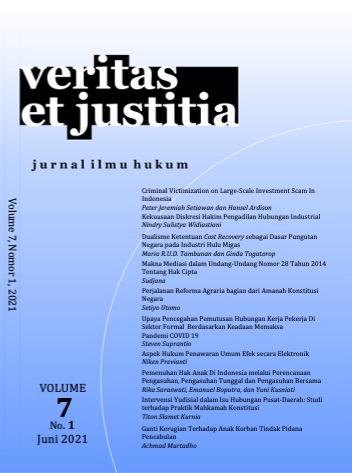PEMENUHAN HAK ANAK DI INDONESIA MELALUI PERENCANAAN PENGASUHAN, PENGASUHAN TUNGGAL DAN PENGASUHAN BERSAMA
DOI:
https://doi.org/10.25123/vej.v7i1.4066Keywords:
Sole-Joint custody, gender equality, parenting plans, divorceAbstract
In many countries, joint custody has replaced and is considered better than sole custody. It is also deemed more in line with the gender equality principle which demands both parents to share responsibility for the custody and care of the child post-divorce. This article discusses how judges in divorce cases decide on child custody, and the extent to which they consider the merits of joint or sole custody and demand divorcees to consider making a parenting plan in the best interest of their children. Qualitative data is collected from the District Court and Religious Court at Semarang and by analysing 4 court decisions regarding child custody. Interestingly, none of the Courts above possess or implements a policy or have some procedural ruling obligating judges in divorce cases to demand parents to consider joint custody or making a parenting plan post-divorce. Obligatory pre-trial mediation is geared more as a procedural-formalistic attempt to dissuade parties to continue with divorce.
References
Buku:
Rika Saraswati, Hukum Perlindungan Anak di Indonesia, PT. Citra Aditya Bakti, Bandung, 2015, hlm.25-26.
Jurnal:
Bala, N., V. Talwar and J. Harris, ‘The Voice of Children in Canadian Family Law Cases’ 24 Cdn. Family Law Q. 221, 2005
Cochran, R.F. Jr. ‘The Search for Guidance in Determining the Best Interests of the Child at Divorce: Reconciling the Primary Caretaker and Joint Custody Preferences’ 20(1) University of Richmond Law Rev. 1985. <http://scholarship.richmond.edu/lawreview/vol20/iss1/2>).
DiFonzo, J. Herbie, From the Rule of One to Shared Parenting: Custody Presumptions in Law and Policy, 52 (2) Family Court Review. 214, 2014.
Elrod, Linda D, Reforming the System to Protect Children in High Conflict Custody Cases, 28(2) William Mitchell Law Review. 506, 2001.
Elrod, Linda. D. and M. D. Dale, ‘Paradigm Shifts and Pendulum Swings in Child Custody: The Interests of Children in the Balance’ 42 (3) Family Law Q. 381, 2008.
Fidler, Barbara J and Rachel Birnbaum, Child Custody Disputes: Private and Public Assesment, 25 (2) Canadian Family Law Quarterly. 137, 140. 2006
Moloney, Lawrie, Child Focused Parenting after Separation: Socio Legal Developments and Challenges, 21(2) ANZJ Fam. 61, 2000.
Rika Saraswati, dan V. Hadiyono, Penghargaan Hak Berpendapat Anak di Pengadilan: Studi Kasus di Pengadilan Negeri Semarang, 13(2) Sawwa Jurnal Studi Gender, 2018. http://journal.walisongo.ac.id/index.php/ sawwa/article/view/3016
Saffer, Martha, Joint Custody, Parental Conflict and Children’s Adjustment to Divorce: What the Social Science Literature Does and Does Not Tell Us, 26 (3) Canadian Family Law Quarterly. 285, 2007
Referensi Tidak Dipublikasi:
Gheavina Ferisma W, Pelaksanaan Kewajiban Pembayaran Nafkah Anak yang Ditetapkan dalam Putusan Pengadilan Agama Semarang, Skripsi S1 Fakultas Hukum dan Komunikasi Unika Soegijapranata, Semarang, 2018, tidak dipublikasi.
Ivan Ricardo Gitowardojo, Pemenuhan Hak Anak Untuk Bertemu Dengan Salah Satu Orang Tuanya Yang Tidak Mendapatkan Hak Asuh SetelahTerjadinya Perceraian Menurut Pasal 14 Ayat (2) Undang-Undang Nomor 35 Tahun 2014 Tentang Perubahan Atas Undang-Undang Nomor 23 Tahun 2002 Tentang Perlindungan Anak (Studi Kasus Putusan No.30/ Pdt.G/2016/PN. Smg dan Putusan No.45/Pdt.G/2016/PN.Smg), Skripsi S1, Fakultas Hukum dan Komunikasi Unika Soegijapranata Semarang, 2017, tidak dipublikasi.
Rika Saraswati, Emanuel Boputra dan Yuni Kusniati, Tinjauan terhadap Sistem Pengasuhan Anak dari Pengasuhan Tunggal Menjadi Pengasuhan Bersama sebagai Perwujudan Pemenuhan Asas Kepentingan Terbaik Anak, penelitian-LPPM Universitas Katolik Soegijapranata, 27-30, 2018,
tidak dipublikasi.
Savira Dita Setiawati, Pelaksanaan Asas Peradilan Sederhana, Cepat dan Biaya Ringan di Pengadilan Negeri Semarang dan Pengadilan Agama Semarang, Skripsi S1 Fakults Hukum dan Komunikasi Unika Soegijapranata, Semarang, 2018, tidak dipublikasi.
V. Hadiyono, Rika Saraswati, Anastasia Anita Carolina Hadi, Jauw, Angelia YS dan Jordan Febriyanto, Penerapan Asas Penghargaan terhadap Hak Berpendapat Anak Dalam Putusan Pengadilan tentang Hak Pemeliharaan dan Mendidik Anak ( Studi Kasus Di Pengadilan Negeri Semarang), Penelitian Fakultas Hukum dan Komunikasi, 2016, tidak dipublikasi.
Peraturan Perundang-undangan:
Undang-Undang R.I., No. 1. Tahun 1974, Perkawinan
Undang-Undang R.I., No. 23 Tahun 2002, PERLINDUNGAN ANAK
Undang-Undang R.I., No. 35 Tahun 2014, Perubahan Atas Undang-Undang Nomor 23 Tahun 2002 tentang Perlindungan Anak.
Instruksi Presiden R.I., No. 1 Tahun 1991, Penyebarluasan Kompilasi Hukum
Islam, Pasal 105.
Putusan Pengadilan:
Putusan Pengadilan Negeri Semarang Nomor: 217/Pdt.G/2014/PN.Smg
Putusan Pengadilan Negeri Semarang Nomor: 428/Pdt.G/2014/PN.Smg
Putusan Pengadilan Negeri Semarang Nomor: 158/Pdt.G/2016/PN.Smg
Putusan Pengadilan Agama Semarang Nomor: 1901/Pdt.G/2017/PA.Smg
Kuesioner dan Wawancara:
Hakim E P pada tanggal 19 Juli 2018.
Hakim MY pada tanggal 19 Juli 2018.
Hakim NN pada tanggal 19 Juli 2018.
Hakim EN pada tanggal 19 Juli 2018.
Hakim MS pada tanggal 16 Juli 2018.
Downloads
Published
Issue
Section
License
Copyright (c) 2021 Veritas et Justitia

This work is licensed under a Creative Commons Attribution-NonCommercial 4.0 International License.
Authors who publish with this journal agree to the following terms:
Authors retain copyright and grant the journal right of first publication with the work simultaneously licensed under a Creative Commons Attribution License that allows others to share the work with an acknowledgement of the work's authorship and initial publication in this journal.
Authors are able to enter into separate, additional contractual arrangements for the non-exclusive distribution of the journal's published version of the work (e.g., post it to an institutional repository or publish it in a book), with an acknowledgement of its initial publication in this journal.
Authors are permitted and encouraged to post their work online (e.g., in institutional repositories or on their website) prior to and during the submission process, as it can lead to productive exchanges, as well as earlier and greater citation of published work.
The Journal allow the author(s) to hold the copyright and to retian publishing rights without restrictions.






